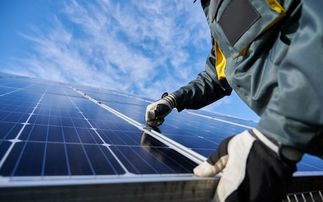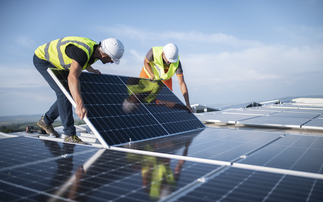New industry guidance comes as Climate Minister Greg Barker urges councils to ensure new developments are sensitively sited
Solar farm developers are being urged to turn their projects into wildlife sanctuaries, with the launch of industry guidance showing how the renewable energy technology can boost biodiversity and improve local habitats.
The UK has seen a surge in the number of new solar farm developments in recent months, prompting criticism in some quarters that projects can eat into agricultural land and lead to the "industrialisation" of the countryside.
However, supporters of solar enegry have long-maintained that projects can help support biodiversity in an area. Panels installed at a solar farm development usually take up less than five per cent of the land in a given area, meaning much of the site remains relatively untouched once the project is complete. Consequently, some developers have found that solar farms can become ideal sites for encouraging birds and insects to thrive.
The industry is now seeking to maximise the biodiversity gains it delivers and has today published new guidance, produced by the BRE National Solar Centre, which encourages developers to use the remaining 95 per cent of their land to create wildlife habitats.
For example, the guidelines outline how supporting hedgerows, encouraging wildflower meadows, or planting winter bird crops can all help support pollinator and birdlife populations.
The Solar Trade Association is hoping to quadruple solar farm capacity installed across the UK to 10GW by 2020. However, the industry has been warned by the government that it needs to develop these projects as sensitively as possible with regards to local habitats and landscapes in order to retain public support and protect the natural environment.
Climate Change Minister Greg Barker has recently warned of a crackdown on "monster solar farms" and last week wrote to local councils highlighting the need to ensure field-based solar farms are sensitively placed. The government's new solar strategy also stressed that it wanted to see an increased focus from the industry on large-scale roof-based installations on offices, supermarkets, factories and warehouses.
However, Harry Huyton, head of climate change at RSPB, said the new industry guidance showed how solar power could offer a double win for the environment.
"The recent IPCC reports show that unless we change our energy systems, climate change threatens to drive the loss of wildlife here in the UK and globally," he said. "The IPCC is also clear that solar power has a huge role to play, so it is particularly satisfying to see solar energy developers pledging to deliver clean energy and nature conservation hand-in-hand.
"The RSPB is keen to see all solar developers following this guidance, which will mean sensitively sited solar farms giving a home to farmland birds and wildlife that are in desperate need of a helping hand."
There are encouraging signs that many developers will follow the voluntary guidance, given that the best practice guidelines build on work already being implemented by a number of leading developers. For example, Solarcentury has launched a campaign with Habitat Aid to plant British native trees and plants near many of its projects that aim to create safe havens for dwindling populations of butterflies, bumblebees, and other insects.
It looks as if the UK solar industry could play a leading role in tackling the crisis in pollinator populations, just as it is playing a leading role in tackling the climate crisis.









